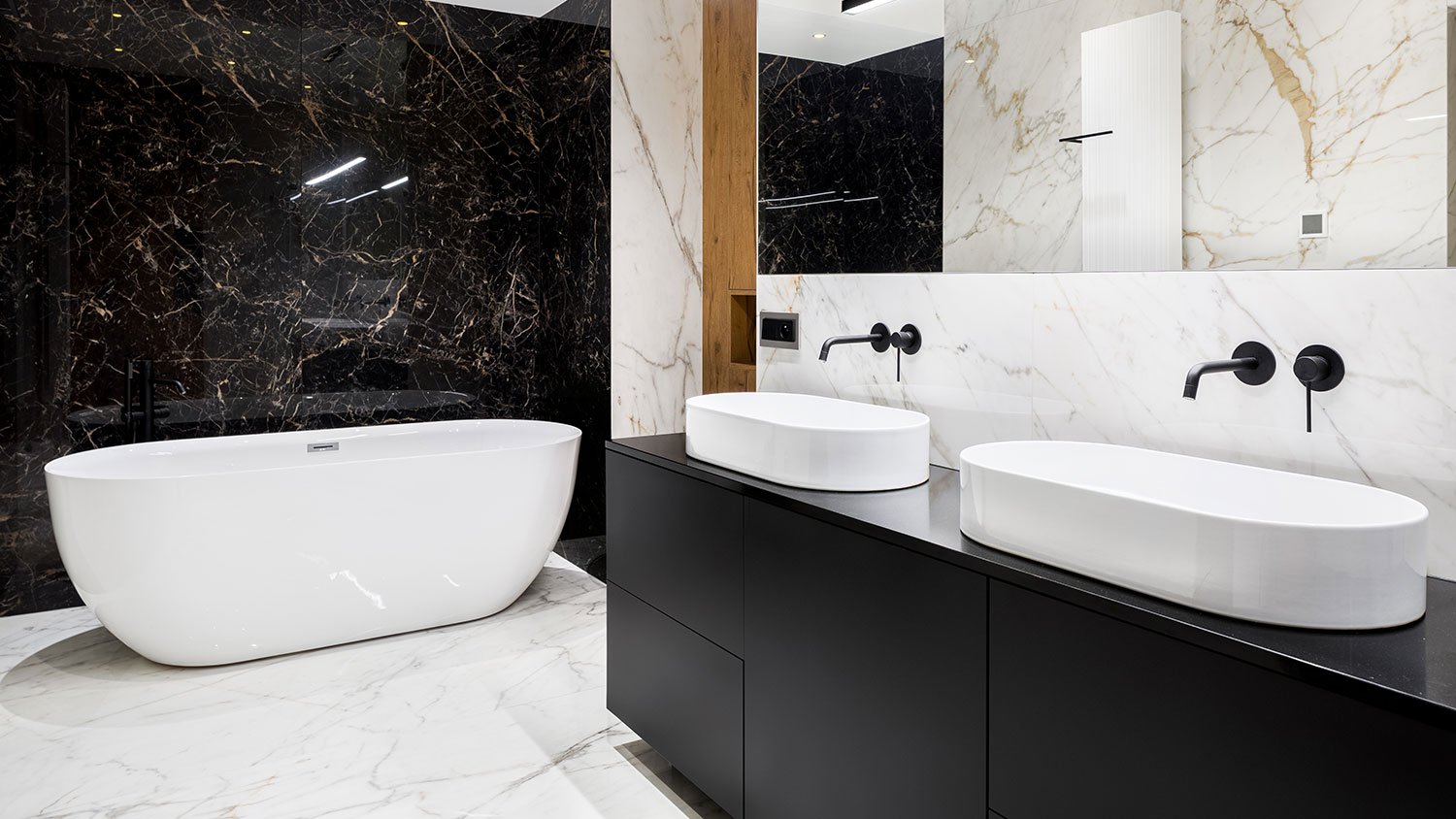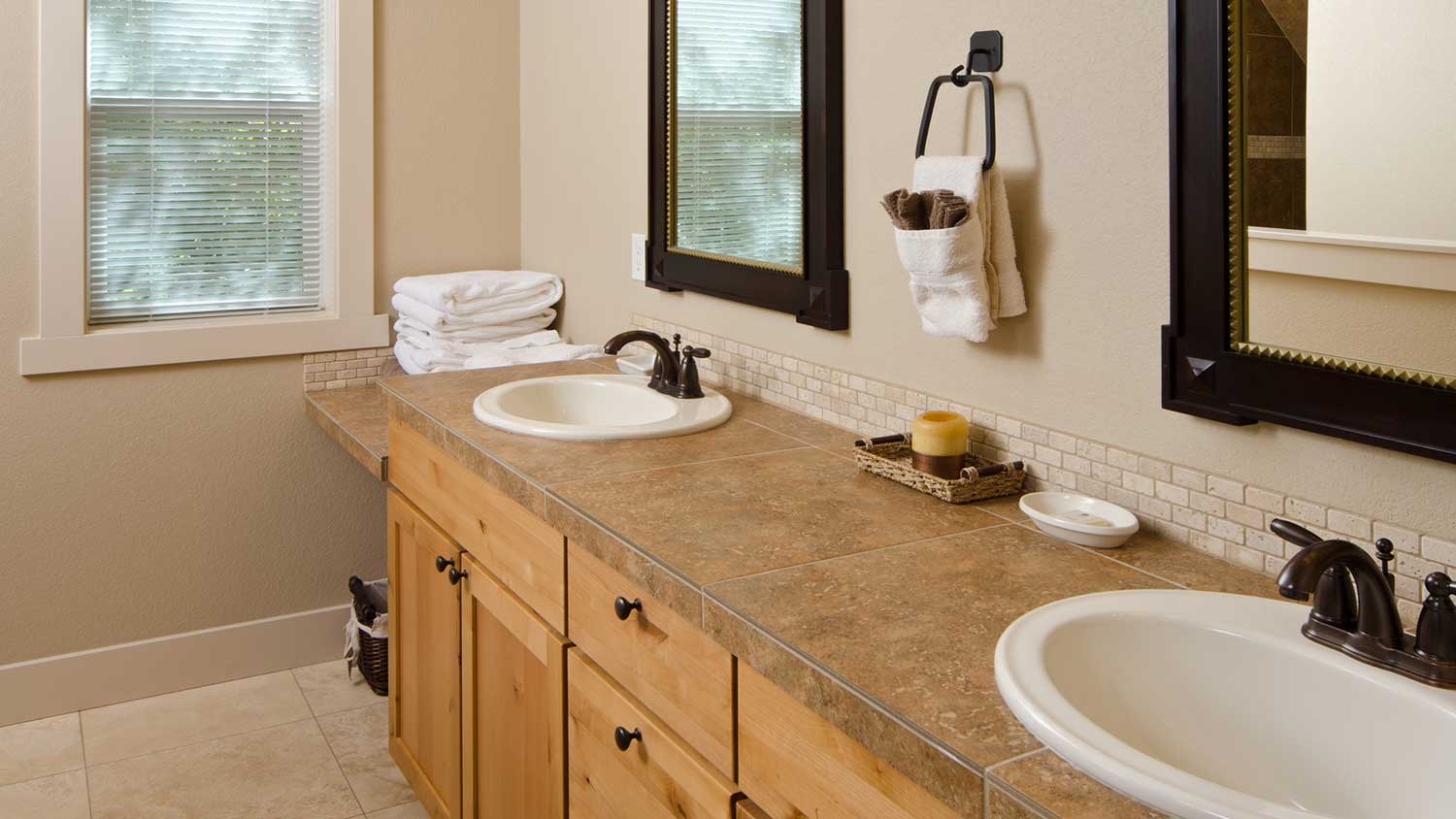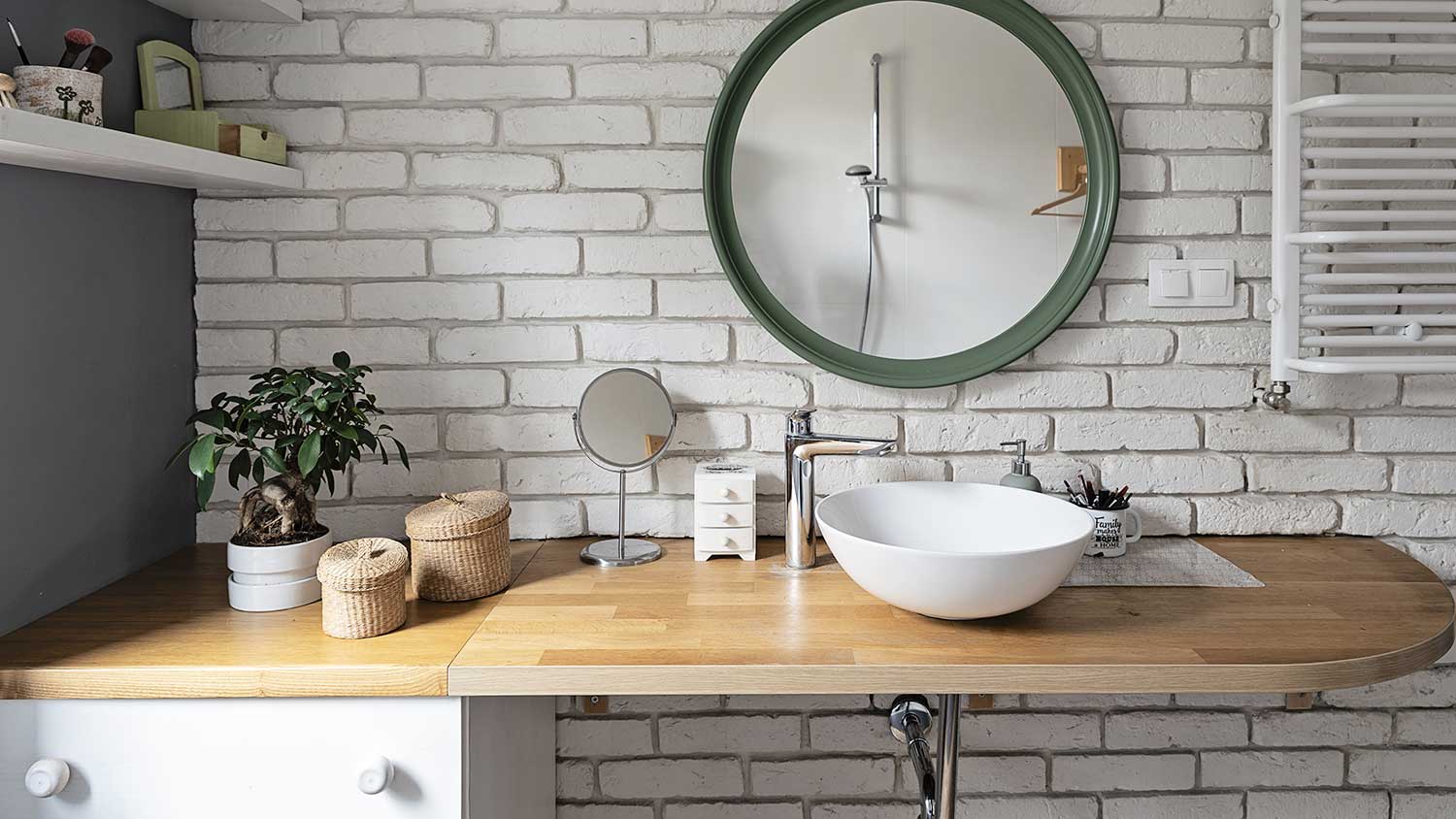7 Types of Bathroom Countertop Materials to Upgrade Your Space
Choose the best bathroom countertop type for your vision and needs


Choosing the countertops for your bathroom is a huge part of your remodel. The material you choose will have a big visual impact and can help tie in all the other elements of the room. Whether you have a small budget, are willing to splurge, want something easy to deal with, or are open to anything as long as it has the right look — here are eight types you should definitely consider.
1. Laminate

Laminate countertops are made with layers of paper, medium-density fiberboard, and a melamine resin layer on top. All the layers are fused under high heat which makes for a durable and long-lasting material. No matter your vision for your kitchen, you’re likely to find your perfect laminate match from solid colors to designs inspired by natural stones.
Typical cost: $10–$40 per square foot
Pros:
Great price point
Long lifespan of 20 to 30 years
Easy to clean and maintain
Cons:
Hard to repair
Damage is easily visible
Seams are unavoidable
2. Ceramic or Porcelain Tile

Porcelain tiles are made from natural clay and fired at 2,192 degrees Fahrenheit (phew, that’s hot!). Ceramic tiles, on the other hand, are made from clay mixed with water, quartz, and sand.
Porcelain and ceramic tiles are a classic choice for bathroom countertops. They’re visually pleasing and are available in a wide range of designs including ones that look like natural stone or wood. You can also get tiles with funky or intricate patterns, or stick with something simple with solid colors.
Typical cost: $0.50 to $40 per square foot
Pros
Durable and work well for countertops
Porcelain is water-resistant
Many DIYers can tackle tile installation
Both materials are easy to clean
Cons
Ceramic tile absorbs water
Grout requires regular cleaning
Porcelain is hard to cut and hard to DIY
Sealant is required
3. Solid Surface
Solid surface countertops are engineered stones made with acrylic polymers and minerals. This can be a great alternative to more expensive options like natural marble and granite countertops. This is because solid surface bathroom countertops look very luxurious without the maintenance requirements of natural stone.
Typical cost: $40 per square foot
Pros
Non-porous and stain-resistant
Easy to repair
Hard to see seams
Cons
Not as heat-resistant as natural stone
More costly than laminate
A trained eye can distinguish between solid surface and real stone
4. Natural Stone
Potentially the most classic, luxe option on this list, natural stone countertops add the wow factor to any bathroom. The most common natural stone countertop options are marble, granite, slate, soapstone, limestone, and travertine. These stones require high maintenance but provide a level of class that’s unmatched. It’s also not a material that’s good for DIY projects—hire a bathroom vanity installer near you instead.
Typical cost: $20–$190 per square foot
Pros
Beautiful appearance
May increase home value
Long lifespan
Cons
Regular maintenance required
Porous
Can be easily scratched or damaged
Cost is typically higher than other countertops
5. Quartz
Quartz countertops are made with engineered stone. Usually, the quartz content is around 10% while the rest is crushed or recycled natural stone, ceramic, glass, and more. Like solid surface countertops, quartz is an attractive alternative to natural stone. However, quartz countertops tend to have a higher price tag (but with some great pros).
Typical cost: $50–$200 per square foot
Pros
Durable and not easily damaged
Non-porous and stain-resistant
Easy to maintain
Cons
High price point compared to other options
Weak against heat
Labor-intensive installation
6. Concrete
Concrete bathroom countertops are sleek and modern, and you can customize your countertop to fit your needs. You might go with an unstained and unpolished counter if you’re looking for an industrial look, or you can get it stained for something more chic. You can also get the counters colored so it matches the rest of your bathroom.
Typical cost: $50–$150 per square foot
Pros
Durable
Cracks are repairable (but hard to DIY)
Customizable
Cons
Can stain and scratch
On higher end of price scale
Requires regular sealing
7. Wood

If you’re looking for bathroom remodel ideas thats off the beaten path, check out wood bathroom countertops. This material gives you the chance to bring nature into the space in a classy and down-to-earth way. There are lots of different wood types to choose from, like maple, birch, teak, and oak. You’ll want to make sure to conduct proper maintenance to avoid water damage.
Typical cost: $60–$100 per square foot
Pros
Beautiful appearance
Unique and memorable
Adds warmth
Cons
Can scratch and dent
Proper installation and sealing is required to avoid water damage issues
Can require refinishing every 10 to 20 years.
Other Considerations for Bathroom Countertops
Here are other considerations to keep in mind when planning your bathroom remodel costs and other details.
Aesthetics: Think about what style you want your bathroom to be. Is it more modern, minimalist, traditional, or natural? Once you’ve established a look, think of the colors and accessories that you will be combining with your vanity.
Finish: Whether you want a matte or glossy finish really depends on what other materials you’ll be using in your bathroom. Matte countertops are great for concealing stains and better suited for on-the-go families that require low-maintenance cleaning. If you have gold or copper accents, matte finishes will make them stand out nicely. High-gloss finishes give your bathroom a modern and sleek feel and work well on granite and marble.
Durability: Make sure you choose something that will withstand elements such as soap, lotions, hairspray, and oils. Otherwise, you’ll be looking at repairing water damaged bathroom vanities.
Variety: If you want to be able to choose from many different colors and styles, make sure you choose a material that will allow you to customize without going over your budget. Laminate and cultured marble are some of the more popular options.
Maintenance: When looking at vanity installation costs, don’t forget to choose something you will have time for. While some can be easy to clean with just soap and water, other materials, such as wood and tile, will need a little extra work to last for years to come.
Kitchen vs. Bathroom Countertop Materials
Choosing a bathroom countertop is much different than choosing kitchen countertop materials. Elements that will be used in a bathroom, such as lotions, sprays and oils, tend to be less abrasive than heat, knife cuts, and food stains.
Speak to someone at your local hardware store and do the research to see what the best bathroom countertop materials are for you and your home.





- The Top 10 Types of Countertop Materials for Your Home
- 9 Low-Maintenance Countertops to Make Your Kitchen Shine
- 17 Beautiful Granite Countertop Alternatives
- The Top 7 Types of Stone Countertops for Your Kitchen
- 10 Affordable Kitchen Countertop Ideas You’ll Love
- 23 Kitchen Countertop Ideas to Fit Any Style
- 11 Unique and Unusual Kitchen Countertop Ideas
- What Are Solid Surface Countertops?: A Beginner’s Guide
- How to Cut Countertops for a DIY Kitchen Reno
- Do Quartz Countertops Need to Be Sealed? Find Out the Answer










